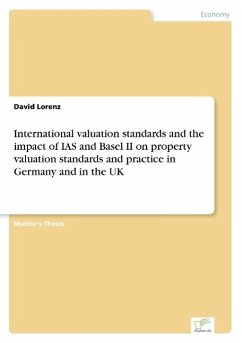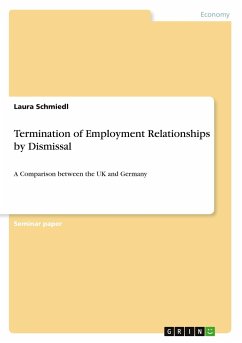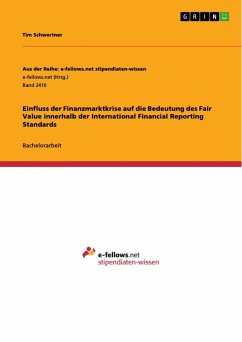Master's Thesis from the year 2002 in the subject Business economics - Miscellaneous, grade: 1,0, Nottingham Trent University (unbekannt), language: English, abstract: Inhaltsangabe:Abstract:
This paper deals with the valuation of property in a global context and discusses contemporary and evolving issues that might affect property valuation standards and practice in Germany and in the United Kingdom. It shows the need, the development and the growing acceptance of International Valuations Standards (IVS) published by the International Valuations Standards Committee and identifies valuations for financial reporting as the key driving force behind the ambition of harmonising valuation standards. Additionally, the major differences between valuation standards and practice in Germany and the UK are examined, the interrelationship between and the discussion about three concurring set of standards (namely Red Book, Blue Book and White Book) is presented and the importance of MarketValue as the central underlying definition of value is highlighted.
Then the parallel development of International Accounting Standards (IAS) and their adoption within the European Union from 2005 onwards is explained and it is shown that this reinforces the position and the acceptance of IVS. Furthermore, the major differences between IAS, German and UK Generally Accepted Accounting Practice regarding the treatment of real estate are shown and the possible consequences for the valuation of fixed assets are derived.
Also the New Basel Capital Accord (Basel II) which determines the way how banks have to allocate capital is identified as another area of interest for the valuation profession. For this reason the methodology of Basel II is explained briefly and the problems and consequences regarding the treatment and valuation of real estate that evolve out of an application of Basel II are explored.
Finally, other areas of interest that might determine the future of property valuation are addressed, notably the issue of sustainability. It is shown that there are numerous benefits of sustainable buildings, that the client demand for them is rising and that valuers will have to consider this aspect because it will affect the Market Value of the property. In sum, this paper shows that there are fundamental differences in the way how the German and the UK valuation scene is acting to cope up with these developments on the international scene, i.e., the UK valuers and the RICS are acting proactive and are at the forefront of new developments (the fact that the RICS based their new Red Book mainly on IVS is the best example), while in contrast in Germany two valuation worlds exist. One which is orientated internationally and which applies internationally accepted standards and valuation methodologies and which is very up to date with global developments; and then there exists the traditional world comprising the majority of German valuers and professional bodies which are trying to hold on to national valuation approaches and which are very suspicious about anything that is new. It is concluded that every single valuer, irregardless of the country he lives in, misses a huge business potential if he does not recognise what is going on internationally and if he does not make attempts to align with the changed client demand.
Abstract (German translation)
Die vorliegende Arbeit behandelt das Thema Immobilienbewertung in einem globalen Kontext und erörtert gegenwärtige Entwicklungen auf den internationalen Finanz- und Bankmärkten, welche die Immobilienbewertungsstandards und praxis in Deutschland und in England beeinflussen werden. Sie zeigt den Nutzen, die Entwicklung und die gesteigerte Akzeptanz der Internationalen Bewertungsstandards (International Valuation Standards IVS), die vom internationalen Bewertungsstandardskomitee veröffentlicht werden. Dabei zeigt sich, dass die stärkste Trie...
Hinweis: Dieser Artikel kann nur an eine deutsche Lieferadresse ausgeliefert werden.
This paper deals with the valuation of property in a global context and discusses contemporary and evolving issues that might affect property valuation standards and practice in Germany and in the United Kingdom. It shows the need, the development and the growing acceptance of International Valuations Standards (IVS) published by the International Valuations Standards Committee and identifies valuations for financial reporting as the key driving force behind the ambition of harmonising valuation standards. Additionally, the major differences between valuation standards and practice in Germany and the UK are examined, the interrelationship between and the discussion about three concurring set of standards (namely Red Book, Blue Book and White Book) is presented and the importance of MarketValue as the central underlying definition of value is highlighted.
Then the parallel development of International Accounting Standards (IAS) and their adoption within the European Union from 2005 onwards is explained and it is shown that this reinforces the position and the acceptance of IVS. Furthermore, the major differences between IAS, German and UK Generally Accepted Accounting Practice regarding the treatment of real estate are shown and the possible consequences for the valuation of fixed assets are derived.
Also the New Basel Capital Accord (Basel II) which determines the way how banks have to allocate capital is identified as another area of interest for the valuation profession. For this reason the methodology of Basel II is explained briefly and the problems and consequences regarding the treatment and valuation of real estate that evolve out of an application of Basel II are explored.
Finally, other areas of interest that might determine the future of property valuation are addressed, notably the issue of sustainability. It is shown that there are numerous benefits of sustainable buildings, that the client demand for them is rising and that valuers will have to consider this aspect because it will affect the Market Value of the property. In sum, this paper shows that there are fundamental differences in the way how the German and the UK valuation scene is acting to cope up with these developments on the international scene, i.e., the UK valuers and the RICS are acting proactive and are at the forefront of new developments (the fact that the RICS based their new Red Book mainly on IVS is the best example), while in contrast in Germany two valuation worlds exist. One which is orientated internationally and which applies internationally accepted standards and valuation methodologies and which is very up to date with global developments; and then there exists the traditional world comprising the majority of German valuers and professional bodies which are trying to hold on to national valuation approaches and which are very suspicious about anything that is new. It is concluded that every single valuer, irregardless of the country he lives in, misses a huge business potential if he does not recognise what is going on internationally and if he does not make attempts to align with the changed client demand.
Abstract (German translation)
Die vorliegende Arbeit behandelt das Thema Immobilienbewertung in einem globalen Kontext und erörtert gegenwärtige Entwicklungen auf den internationalen Finanz- und Bankmärkten, welche die Immobilienbewertungsstandards und praxis in Deutschland und in England beeinflussen werden. Sie zeigt den Nutzen, die Entwicklung und die gesteigerte Akzeptanz der Internationalen Bewertungsstandards (International Valuation Standards IVS), die vom internationalen Bewertungsstandardskomitee veröffentlicht werden. Dabei zeigt sich, dass die stärkste Trie...
Hinweis: Dieser Artikel kann nur an eine deutsche Lieferadresse ausgeliefert werden.








